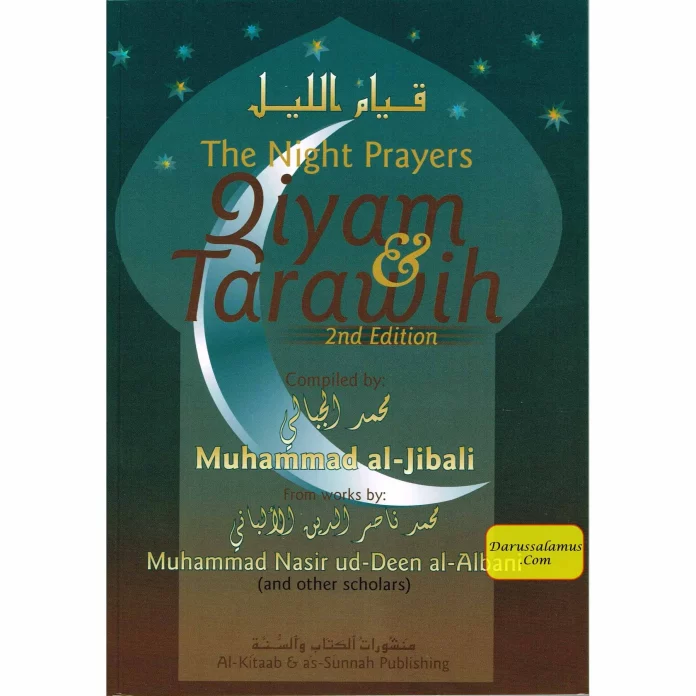The Night Prayers Qiyam & Tarawih By Muhammad Al-Jibaly

” Night Prayers ” One of the most spiritually enriching practices in Islam is the night prayers—Qiyam and Tarawih. They pacify the heart, train the soul, and bring one closer to Allah. In his classic book, The Night Prayers: Qiyam & Tarawih, Muhammad Al-Jibaly presents a comprehensive, genuine guide based on the Qur’an and Sunnah. This book is not only for students or scholars of knowledge it is for all Muslims who wish to enhance their relationship with Allah through night prayer.
About the Author
Muhammad Al-Jibaly is a renowned Islamic scholar who has made a reputation for himself due to his stringent research and devotion to original teachings. Al-Jibaly was born in Syria but grew up in the United States. He learned intensively under scholars from Saudi Arabia and other places. He has written several books about Islamic rituals and beliefs and is well known because of his precision, clarity, and depth of knowledge. The Night Prayers demonstrates his methodology—based on textual evidence, structured for accessibility, and composed to teach and motivate.
What Are the Night Prayers?
In Islam, the night prayers are voluntary prayers that are performed after ‘Isha and prior to Fajr. These are Qiyam al-Layl, Tahajjud, and Tarawih. Although they are not mandatory, they are highly recommended and reward one with tremendous spiritual gain. The Prophet Muhammad ﷺ never gave them up and encouraged others to perform them daily.
Qiyam al-Layl is “standing at night” and refers to any prayer that is performed at night after sleeping. Tahajjud is usually used interchangeably with Qiyam but specifically to refer to prayers after waking up in the middle of the night. Tarawih is a type of night prayer done especially in Ramadan.
The Structure and Content of the Book
Muhammad Al-Jibaly structures the book in a functional and instructive manner. He starts by discussing the significance and merits of Qiyam and Tarawih, with reference to verses of the Qur’an and sound hadiths. He then proceeds to the historical evolution of the night prayers, from how the Prophet ﷺ practiced them, how the companions carried them forward, and how they became an established routine during Ramadan.
The book deals with:
The virtues and importance of night prayers. The practice of performing Qiyam and Tarawih. Most common errors and innovations in night prayers. Women and children in night prayers. Praying individually or in congregation. The number of rak’ahs that should be done. The length and sequence of recitation. Each chapter is full of references, making it a reliable guide for whoever wants to perform Islam properly.
Significance of Qiyam al-Layl
One of the greatest attributes of the believer is rising for Qiyam. Allah approves of the people of the night in the Qur’an: “They arise from [their] beds; they supplicate their Lord in fear and aspiration…” (Surah As-Sajdah 32:16). Qiyam cleanses the soul, enhances endurance, and forms an intimate, personal relationship with Allah.
In this book, Al-Jibaly brings back to life the forgotten tradition of nightly prayer. He underlines that Qiyam is not the exclusive domain of scholars or elders. It is a Sunnah open to all Muslims young, old, male, or female.
Understanding Tarawih in Ramadan
One of the strongest parts of the book deals with Salat al-Tarawih. Mosques are packed with people standing in rows during Ramadan to listen to the beautiful recitation of the Qur’an. But most Muslims are confused about where Tarawih came from, what it looks like, and what rules it follows.
Al-Jibaly illustrates that the Prophet ﷺ performed Tarawih in congregation only for a few nights and discontinued, in case it becomes obligatory. It was reinstated during the era of Umar ibn Al-Khattab رضي الله عنه as a congregational action. The book discusses whether 8 or 20 rak’ahs are to be performed and presents both practices with evidence, calling for unity and non-sectarian conflict.
He also dispels myths such as rushing to recite or reading from an instrument during praying leadership—and suggests a more present, spiritually meaningful experience.
Women and Night Prayers
A worthwhile aspect of the book is its advice to women. Al-Jibaly emphasizes that women are completely encouraged to join night prayers, either privately at home or in congregation at the mosque. He discusses the role of modesty, privacy, and spiritual uplift that women can achieve through consistent night prayers.
The Prophet ﷺ stated, “May Allah be merciful to a man who rises up during the night and offers his prayer and awakens his wife and if she does not obey, sprinkles water on her face…” (Abu Dawood). Al-Jibaly employs this and other hadiths to encourage men and women to encourage one another in worship.
Practical Advice for Consistency
One of the issues Muslims encounter with night prayers is consistency. Most start off with zeal but soon drop off because they are tired or have no time. Al-Jibaly gives some practical tips on how to turn Qiyam into a sustainable habit:
Start with a short prayer—only 2 rak’ahs, Time Qiyam in advance of Fajr for a few minutes, Do not eat much before bed, Involve family members and Prioritize sincerity over quantity. He also relates anecdotes of pious ancestors who incorporated Qiyam into their daily routine, praying for hours during the night with sincerity and dedication.
A Revival of the Sunnah
During a period when most Muslims yearn for spiritual anchoring, The Night Prayers reminds readers of the riches that lie in the late portion of the night. The Prophet ﷺ taught, “Our Lord descends each night to the lowest heaven when the last third of the night remains and says: ‘Who will call upon Me so that I may answer him?’” (Bukhari & Muslim). This book invites readers to avail themselves of this sacred moment.
Al-Jibaly’s book is not just a reference—it is an invitation. An invitation to reawaken with Allah while the world slumbers. An invitation to revive the Sunnah of our dear Prophet ﷺ in the stillness of the night.
Conclusion
The Night Prayers: Qiyam & Tarawih by Muhammad Al-Jibaly is a must-read for Muslims who want to deepen their worship. Full of valid references, practical tips, and spiritual inspiration, the book leads believers into placing night prayers in their lives in a meaningful way. New Muslims can benefit from this book, while older ones can dive deeper into their faith. This book is a trusted companion that will turn your nights into ones filled with light, mercy, and divine compassion. Make Qiyam and Tarawih not only seasonal rituals, but lifelong acts of worship. Begin tonight with one rak’ah, one tear, and one genuine intention.
Read more: Quran English Transliteration by Online Islamic book











